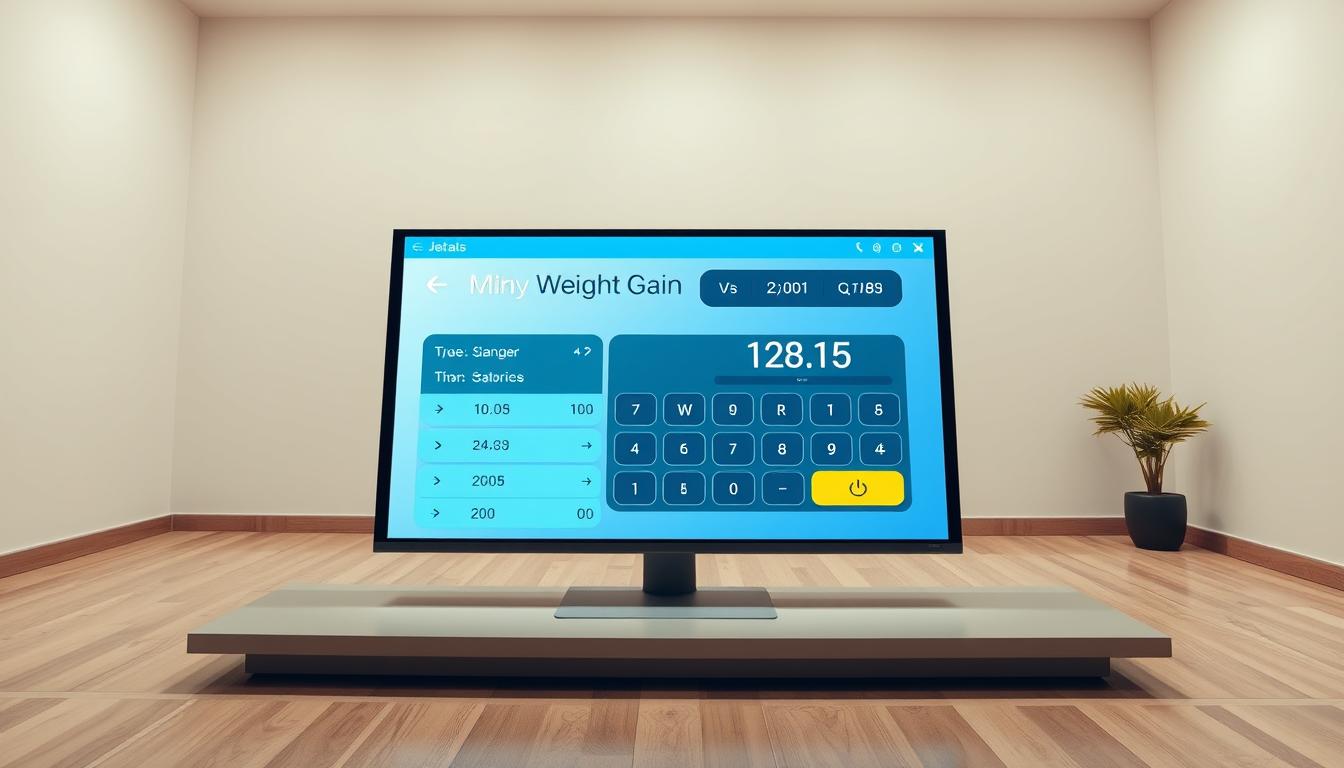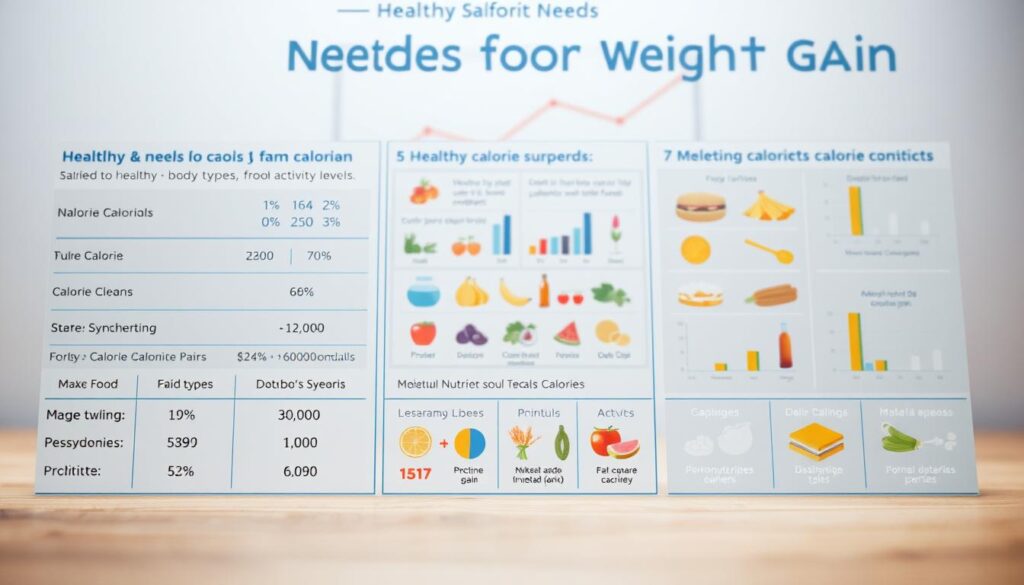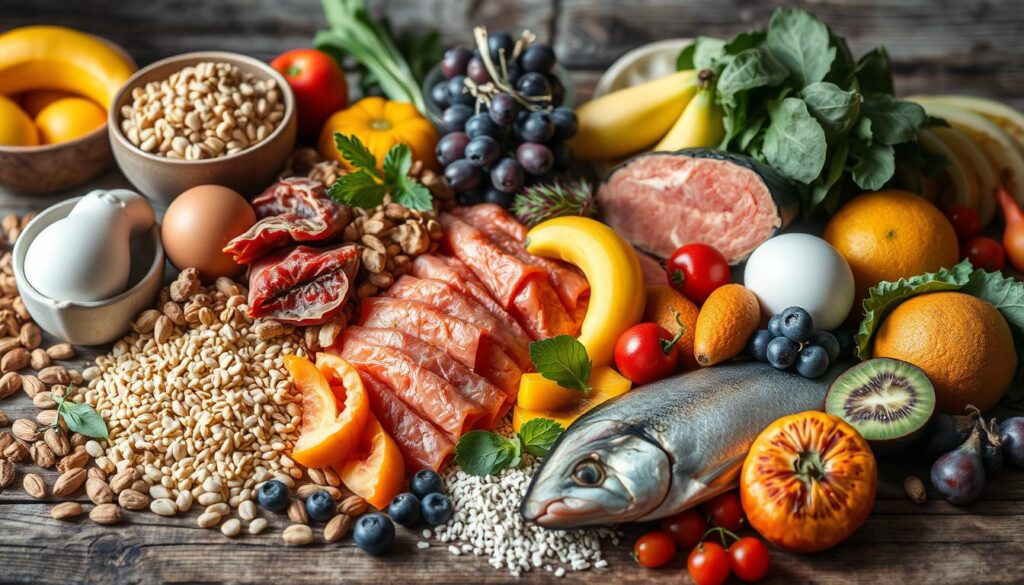“You don’t have to be great to start, but you have to start to be great.” – Zig Ziglar. For many, gaining weight in a healthy manner can be just as challenging as losing it.
We understand that everyone’s body and nutritional needs are different, making a personalized approach crucial for successful weight gain.
Our comprehensive calculator is designed to help individuals achieve their goals by determining their current body metrics, activity level, and goals to create a tailored calorie and nutrient plan.
By providing the right calories and nutrients, we can support healthy weight gain and overall well-being.
Key Takeaways
- Our calculator provides a personalized approach to weight gain.
- It determines your current body metrics and activity level.
- A tailored calorie and nutrient plan is created based on your goals.
- Healthy weight gain is about more than just increasing calories.
- It’s about providing your body with the right nutrients.
Understanding Healthy Weight Gain
For individuals struggling with being underweight, understanding the principles of healthy weight gain can be a transformative step towards improving their overall health and quality of life. Healthy weight gain is not just about consuming more calories; it’s about adopting a balanced diet and lifestyle that promotes overall well-being.
The Importance of Healthy Weight Gain
Healthy weight gain is crucial for individuals who are underweight, as it can help mitigate various health risks. Being underweight can lead to a range of health issues, including malnutrition and decreased immune function. Gaining weight in a healthy manner can improve energy levels, enhance immune function, and boost overall quality of life. It’s about gaining muscle mass and not just fat, which is essential for a healthy body composition.
Risks Associated with Being Underweight
Being underweight is associated with several health risks, including malnutrition, vitamin deficiencies, osteoporosis, and decreased fertility. It can also lead to an increased risk of complications from surgery and a slower metabolic rate, which isn’t always beneficial. The table below summarizes some of the key health risks associated with being underweight.
| Health Risk | Description |
|---|---|
| Malnutrition | Lack of essential nutrients necessary for the body to function properly. |
| Osteoporosis | A condition characterized by weakened bones, making them more susceptible to breaks. |
| Decreased Immune Function | Weakened immune system, making the body more prone to infections. |
Understanding these risks highlights the importance of achieving a healthy weight through a balanced diet and appropriate lifestyle changes. By focusing on nutrient-dense foods and a sustainable weight gain plan, individuals can improve their overall health and reduce the risks associated with being underweight.
How Our Healthy Weight Gain Diet Plan Calculator Works
Our healthy weight gain diet plan calculator is designed to provide personalized recommendations based on your specific needs and goals. To achieve a healthy weight gain, it’s crucial to understand your daily calorie needs and how they change over time as you gain weight.
The calculator takes into account several factors, including your unit of measurement, sex, height, weight, age, activity level, target weight, and desired weight gain pace. By considering these variables, we can estimate your basal metabolic rate (BMR) and total daily energy expenditure (TDEE), which are essential for determining your daily calorie requirements.
Key Components of the Calculator
The calculator is composed of several key components that work together to provide a comprehensive weight gain plan. These include:
- Your gender, age, current weight, and height, which help us calculate your BMR.
- Your activity level, which affects your TDEE and overall calorie needs.
- Your target weight and desired rate of weight gain, which determine the necessary calorie surplus.
By factoring in these elements, the calculator can provide a tailored plan that suits your specific needs.
Interpreting Your Results
Once you’ve entered the required information, the calculator will generate a personalized report outlining your daily calorie needs for weight gain. This report will include:
- Your maintenance calories versus the calories needed for weight gain.
- A timeline for reaching your weight goal based on your chosen rate of gain.
- A graph illustrating how your calorie intake should change week by week and how your weight will increase over time.
For example, a 28-year-old woman who is 170 cm tall, weighs 60 kg, has a light activity level, and wants to reach 65 kg at a normal pace would need about 2407 calories initially, increasing to 2477 calories by week 10.
Calculating Your Calorie Needs for Weight Gain
To gain weight healthily, it’s crucial to understand your daily calorie needs. Your body requires a certain number of calories to maintain its current weight, and to gain weight, you need to consume more calories than you burn. This surplus of calories provides your body with the energy it needs to build muscle and store fat.
The first step in calculating your calorie needs for weight gain is understanding your Basal Metabolic Rate (BMR) and Total Daily Energy Expenditure (TDEE). BMR represents the number of calories your body needs to perform basic life-sustaining functions at rest, such as breathing, circulation, and cell production.
Understanding BMR and TDEE
BMR is calculated using the Mifflin-St Jeor Equation, which is considered the most accurate formula. For men, the equation is BMR = 10W + 6.25H – 5A + 5, and for women, it’s BMR = 10W + 6.25H – 5A – 161, where W is body weight in kg, H is height in cm, and A is age. Your TDEE takes into account not just your BMR but also the calories you burn through daily activities and exercise.
- BMR calculation helps in understanding the baseline calorie needs.
- TDEE gives a more accurate picture of your daily calorie expenditure.
- Activity factors are used to adjust BMR to TDEE based on your lifestyle.
Creating a Calorie Surplus
To gain weight, you need to create a calorie surplus by consuming more calories than your TDEE. A safe and effective way to do this is by adding 300-500 calories to your TDEE for gradual weight gain or 700-1,000 calories for faster gain. It’s essential to understand that approximately 7,000 extra calories are needed to gain 1 kg (2.2 lbs) of body weight.
Factors such as age, gender, current weight, height, and activity level influence your calorie needs. Monitoring your weight gain and adjusting your calorie intake accordingly is crucial. A balanced diet with the right mix of proteins, carbohydrates, and fats is also vital for healthy weight gain.
By understanding your BMR and TDEE and creating an appropriate calorie surplus, you can develop a personalized plan for healthy weight gain. This approach ensures that you’re consuming the right amount of calories to support your weight gain goals without overdoing it.
Macronutrient Ratios for Optimal Weight Gain
The journey to healthy weight gain involves not just eating more, but eating right, with a focus on the correct macronutrient ratios. We need to understand that the right balance of proteins, fats, and carbohydrates is crucial for optimal weight gain.
Nutritional Building Blocks
For those seeking to gain weight and build muscle mass, understanding the role of each macronutrient is essential.
Protein Requirements
For those seeking to gain muscle mass, protein intake is paramount. The US RDA recommends 0.8g/kg (0.4g/lb) of body weight, but for muscle gain, we recommend exceeding this to at least 0.7 to 1 gram of protein per pound of body weight (1.5 to 2.2 grams per kilogram). Protein is essential for muscle synthesis and repair, and inadequate intake can limit muscle growth even with sufficient calories.
Healthy Fats
Healthy fats are vital for hormone production, brain function, and providing concentrated calories (9 calories per gram). We emphasize the importance of unsaturated fats from sources like avocados, nuts, and olive oil. These fats not only support overall health but also contribute to a calorie surplus necessary for weight gain.
Complex Carbohydrates
Complex carbohydrates provide energy for workouts and replenish glycogen stores, which is crucial for those combining weight gain with strength training. Foods rich in complex carbohydrates include whole grains, fruits, and vegetables. These foods are not only rich in carbs but also in fiber, vitamins, and minerals.
| Body Type/Goal | Protein (%) | Fat (%) | Carbohydrates (%) |
|---|---|---|---|
| Lean Muscle Gain | 40 | 20 | 40 |
| Balanced Weight Gain | 30 | 30 | 40 |
| High-Intensity Athlete | 25 | 25 | 50 |
Adjusting macronutrient ratios based on individual needs and goals is crucial. For instance, those aiming for lean muscle gain may require a higher protein intake, while high-intensity athletes may need more carbohydrates to support their energy needs.
By understanding and applying the right macronutrient ratios, individuals can optimize their weight gain journey, ensuring they not only consume enough calories but also support their body‘s nutritional needs.
Nutrient-Dense Foods for Healthy Weight Gain
Focusing on nutrient-dense foods is key to gaining weight healthily and sustainably. We will explore various food groups that are rich in calories, protein, healthy fats, and complex carbohydrates, all of which are essential for healthy weight gain.
Protein-Rich Food Options
Protein is crucial for muscle growth and repair. We categorize protein-rich foods into animal sources like meats, dairy, and eggs, and plant sources such as legumes, tofu, tempeh, and seitan. Examples of high-protein foods include lean meats, fish like salmon, eggs, and dairy products. For those preferring plant-based options, legumes, nuts, and seeds are excellent choices.
Healthy Fat Sources
Healthy fats are vital for overall health and provide a concentrated source of calories. We differentiate between saturated, monounsaturated, and polyunsaturated fats. Nutrient-dense sources of healthy fats include nuts, seeds, avocados, olive oil, and fatty fish rich in omega-3 fatty acids.
Calorie-Dense Carbohydrates
Carbohydrates are a primary source of energy. For healthy weight gain, we recommend focusing on calorie-dense carbohydrate sources such as whole grains, starchy vegetables like sweet potatoes and yams, dried fruits, and legumes. These foods not only provide energy but are also rich in essential micronutrients.
By incorporating these nutrient-dense foods into your diet and strategically combining them, you can create balanced and calorie-dense meals that support healthy weight gain. Additionally, tips such as adding healthy oils, nuts, or seeds to your meals can further enhance calorie intake without relying on processed foods.
Creating Your Personalized Weight Gain Meal Plan
Now that you know your calorie requirements, let’s focus on building a tailored meal plan for optimal weight gain. Creating a personalized meal plan involves understanding your daily calorie needs and macronutrient ratios, which we’ve discussed in previous sections.
To start, you can refer to our 3400-calorie diet plan as a reference point for structuring your meals. This will give you an idea of how to distribute your calorie intake throughout the day.
Sample Meal Plans
Sample meal plans can serve as a useful guide. For instance, a 3000 calorie per day meal plan might include three main meals and two to three snacks, ensuring you’re consuming enough calories to support weight gain. Here’s an example of what a daily meal plan could look like:
| Meal | Food | Calories |
|---|---|---|
| Breakfast | Oatmeal with nuts and fruits | 500 |
| Mid-Morning Snack | Protein shake with banana | 300 |
| Lunch | Grilled chicken with quinoa and vegetables | 700 |
| Afternoon Snack | Nuts and dried fruits | 250 |
| Dinner | Salmon with sweet potatoes and green beans | 600 |
| Before Bed Snack | Cottage cheese with berries | 200 |
| Total | 3050 |
Variations of meal plans are available for different dietary preferences, including omnivore, vegetarian, and vegan options. It’s essential to choose a meal plan that aligns with your dietary preferences and lifestyle.

Meal Timing and Frequency
Meal timing and frequency play a crucial role in weight gain. Eating more frequently can make it easier to consume sufficient calories. We recommend having three main meals and two to three snacks in between, spaced out evenly throughout the day.
Strategic meal timing around workouts can also maximize muscle growth and recovery. Consuming protein and carbohydrates before and after training can be particularly beneficial. For example, having a protein shake with a banana before your workout and a meal with chicken and quinoa after your workout.
To avoid digestive discomfort, it’s advisable to gradually increase your portion sizes and calorie intake over time. Additionally, food preparation and planning are key to ensuring a consistent calorie surplus. Meal prep strategies can be particularly helpful for busy individuals.
Exercise Strategies to Support Healthy Weight Gain
Exercise is a critical component of a healthy weight gain plan, helping to ensure that the weight gained is muscle mass rather than fat. When aiming to gain weight, it’s not just about consuming more calories, but also about exercising correctly to build muscle.
Strength Training Fundamentals
To effectively gain weight, focusing on strength training is essential. This involves performing low-rep, high-weight lifts at least 2 to 4 times per week. Key exercises include leg building workouts such as barbell squats, dumbbell lunges, and leg press, as well as upper body workouts like incline chest press and dumbbell pullovers. Proper form and technique are crucial to prevent injuries and maximize muscle engagement.
Balancing Cardio with Strength Training
While cardiovascular exercise is important for heart health, excessive cardio can hinder weight gain efforts by burning too many calories. It’s recommended to limit high-intensity cardio and focus on low-intensity activities like walking. When combining cardio with strength training, prioritize anaerobic exercise (lifting) first to have enough energy for maximum muscle growth. Balancing both aspects is key to a successful weight gain program.
Adjusting your exercise routine based on your progress is also vital. This may involve increasing or decreasing activity levels depending on your rate of weight gain. By focusing on strength training and balancing it with cardio, you can effectively support your weight gain goals.
Tracking Your Progress and Making Adjustments
To successfully gain weight in a healthy manner, it’s essential to track your progress regularly. This involves not just monitoring your weight, but also understanding changes in your body composition. By doing so, you can ensure that you’re gaining weight at a healthy rate and make adjustments as needed.
Monitoring Weight and Body Composition
For effective tracking, it’s recommended to take measurements over longer periods, such as weekly, rather than daily. This helps account for normal fluctuations in weight due to factors like water intake or time of day. Weighing yourself under consistent conditions, like as soon as you wake up and before breakfast, provides a more accurate picture of your progress.
Besides tracking weight, measuring body composition is crucial. Methods include using skinfold calipers, bioelectrical impedance scales, or DEXA scans to differentiate between muscle and fat gain. Taking body measurements (chest, waist, hips, arms, thighs) is another effective way to monitor changes in your body.
When and How to Adjust Your Plan
Interpreting your progress data correctly is key to making informed decisions about your weight gain plan. A healthy rate of weight gain is typically considered to be 0.25-0.5kg or 0.5-1lb per week. If your weight gain is too slow, you may need to increase your calorie intake. Conversely, if you’re gaining too much fat, you might need to slightly decrease your calorie intake or adjust your macronutrient ratios.
Plateaus are common in weight gain journeys. To overcome them, consider further increasing your calories or changing your training program. For more strategies on effective weight management, you can visit our page on BMI weight loss strategies. Patience and consistency are vital, as healthy weight gain is a gradual process that requires time and dedication.
Taking the First Step Toward a Healthier You
As we conclude our journey through the world of healthy weight gain, it’s time to take the first step towards a stronger, healthier body. We’ve covered the essential aspects of gaining weight in a healthy manner, from understanding your calorie needs to creating a balanced diet and incorporating appropriate exercise.
To begin, use our healthy weight gain diet plan calculator to determine your daily caloric intake. This will provide a foundation for your weight gain journey. Next, create a meal plan that includes nutrient-dense foods and balances your macronutrient ratios. Implementing a suitable exercise routine, particularly strength training, will help you build muscle mass.
Remember, healthy weight gain is a marathon, not a sprint. Consistency over time is more important than rapid results. Track your progress weekly and make adjustments as needed. Be patient and stay committed to your goals.
By following these steps and staying committed to your goal, you’ll be on your way to achieving a healthier, stronger body. Start your journey today with our weight gain calculator and take the first step towards a healthier you.





